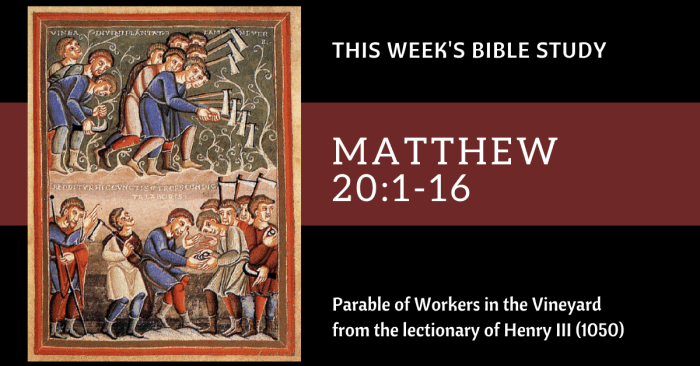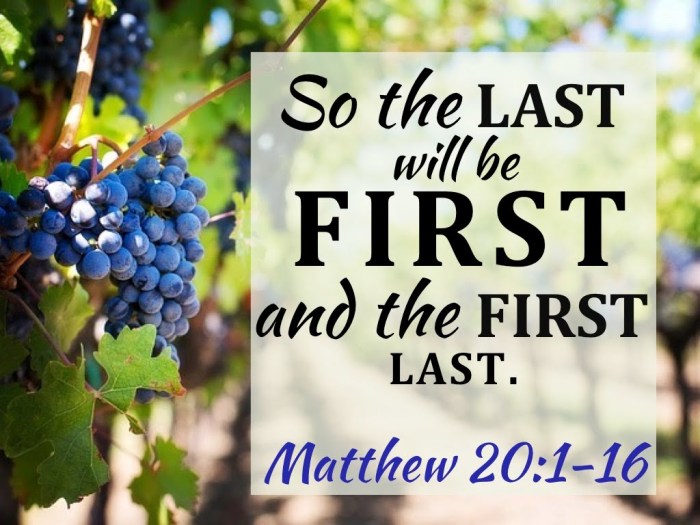Matthew 20 1-16 bible study questions – Delve into the parable of the workers in the vineyard in Matthew 20:1-16, a profound teaching that challenges our understanding of justice and grace. This parable offers a unique perspective on the kingdom of heaven, the nature of work and reward, and the importance of humility.
As we explore the parable’s characters and events, we will uncover valuable lessons about God’s ways and how we should respond to them. Join us on this journey of discovery and reflection.
The Parable of the Workers in the Vineyard

Jesus told this parable to his disciples to illustrate the nature of the kingdom of heaven and the rewards that await those who follow him. The parable is set in a vineyard, where a landowner hires workers at different times of the day to work in his vineyard.
The Main Events of the Parable
- A landowner hires workers at different times of the day, promising them a denarius for a day’s work.
- At the end of the day, the landowner pays all the workers the same amount, regardless of how long they worked.
- The workers who were hired first grumble and complain, but the landowner tells them that he is free to do what he wants with his own money.
The Significance of the Different Characters
- The landownerrepresents God, who is sovereign and has the right to do as he pleases.
- The workersrepresent those who follow Jesus, and the different times of day represent the different stages of their lives.
- The denariusrepresents the reward that God gives to those who follow him, which is eternal life.
The Kingdom of Heaven and Wages

The parable of the workers in the vineyard teaches us that the kingdom of heaven is not like a human kingdom, where rewards are based on merit. In the kingdom of heaven, all who follow Jesus will receive the same reward, regardless of their works.
Equal Rewards for Unequal Work
This concept of equal rewards for unequal work is a stumbling block for many people. They believe that it is unfair for someone who has worked hard all their life to receive the same reward as someone who has only worked for a short time.
God’s Justice
However, God’s justice is not based on human standards. God is not interested in how much we do, but in how much we love him. The parable of the workers in the vineyard teaches us that God’s grace is a free gift, and that we cannot earn it by our own works.
The Grumbling Workers
The workers who were hired first in the parable represent those who believe that they deserve a greater reward than others because they have worked harder.
Their Discontent and Complaints, Matthew 20 1-16 bible study questions
- They are discontent because they believe that they have been treated unfairly.
- They complain to the landowner, saying that they have worked all day, while the workers who were hired last have only worked for an hour.
Lessons from Their Attitudes
The parable teaches us that we should not be envious of others who receive the same reward as us, even if we believe that we have worked harder. We should be grateful for God’s grace, and we should not compare ourselves to others.
The Owner’s Response

The landowner’s response to the grumbling workers is that he is free to do what he wants with his own money.
Fairness and Reasonableness
The landowner’s response is fair and reasonable because he is the owner of the vineyard. He has the right to do what he wants with his own property.
“Is it not lawful for me to do what I wish with my own things?”
The landowner’s question, “Is it not lawful for me to do what I wish with my own things?” is a rhetorical question. He is not asking for permission, but rather stating that he has the right to do as he pleases.
The Last Shall Be First: Matthew 20 1-16 Bible Study Questions

The parable of the workers in the vineyard concludes with the statement: “The last shall be first, and the first last.” This statement means that those who are considered last in this world will be first in the kingdom of heaven, and those who are considered first in this world will be last in the kingdom of heaven.
Evidence in the Parable
This principle is evident in the parable in the way that the workers who were hired last received the same reward as the workers who were hired first.
Implications for Our Lives
The parable teaches us that we should not be concerned with our status in this world, but rather with our relationship with God. The kingdom of heaven is not about who is first or last, but about who loves God and follows him.
Faith and Humility
The parable of the workers in the vineyard teaches us the importance of faith and humility.
Trusting God’s Ways
The parable teaches us that we should trust God’s ways, even when we do not understand them. The workers who were hired first did not understand why the landowner paid them the same amount as the workers who were hired last, but they trusted that he had a good reason.
Importance of Humility
The parable also teaches us the importance of humility. The workers who were hired first were proud of their work, and they believed that they deserved a greater reward than the workers who were hired last. However, the landowner humbled them by giving them the same reward as the other workers.
Key Questions Answered
What is the main message of the parable of the workers in the vineyard?
The main message of the parable is that God’s grace is freely given and is not based on our works. We are all called to work in God’s vineyard, and we will all receive a reward, regardless of when we start working.
Why were the workers who were hired first angry?
The workers who were hired first were angry because they thought they deserved a greater reward than the workers who were hired last. They did not understand that God’s grace is not based on our works.
What does the parable teach us about humility?
The parable teaches us that we should be humble and content with what we have. We should not compare ourselves to others or expect to be rewarded based on our own merits.